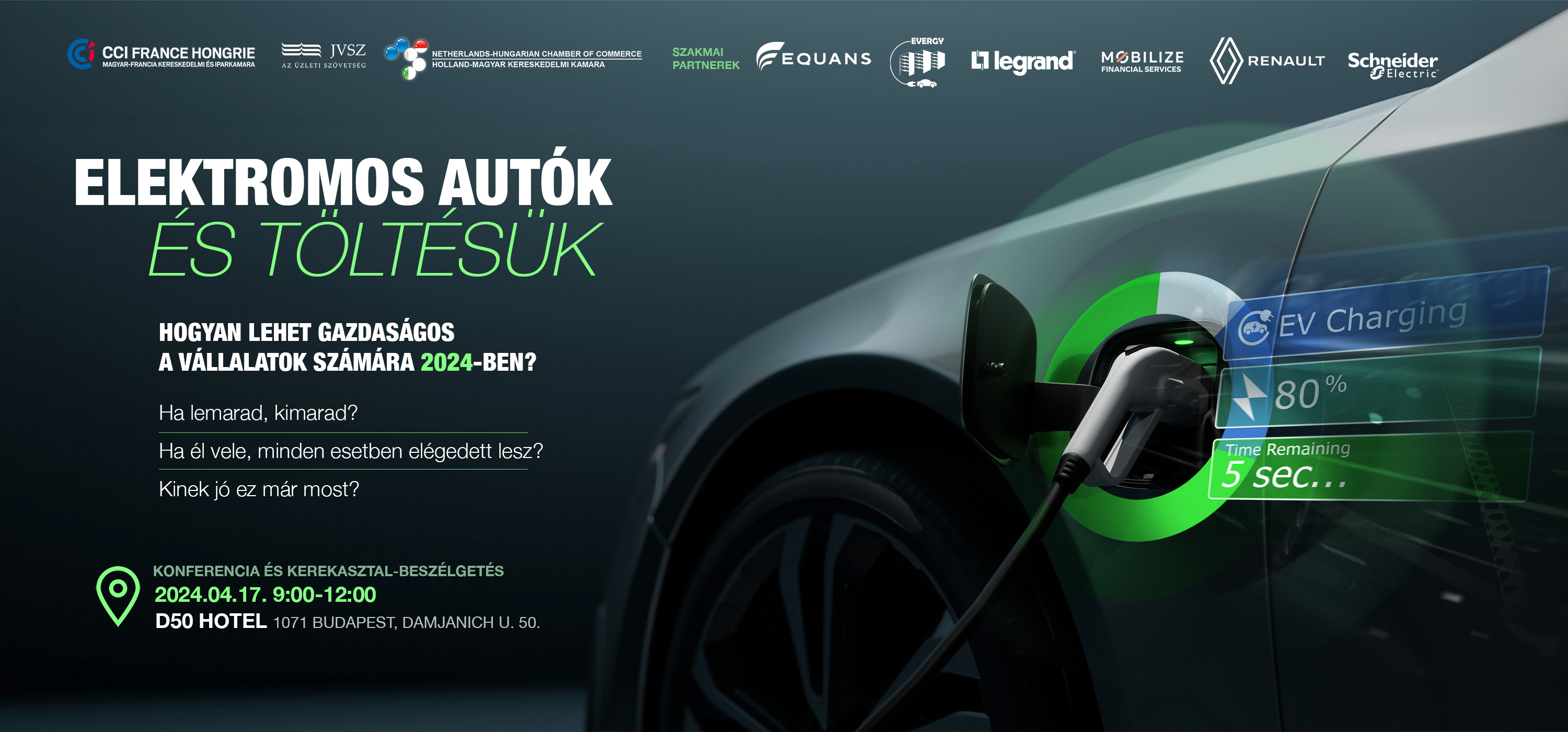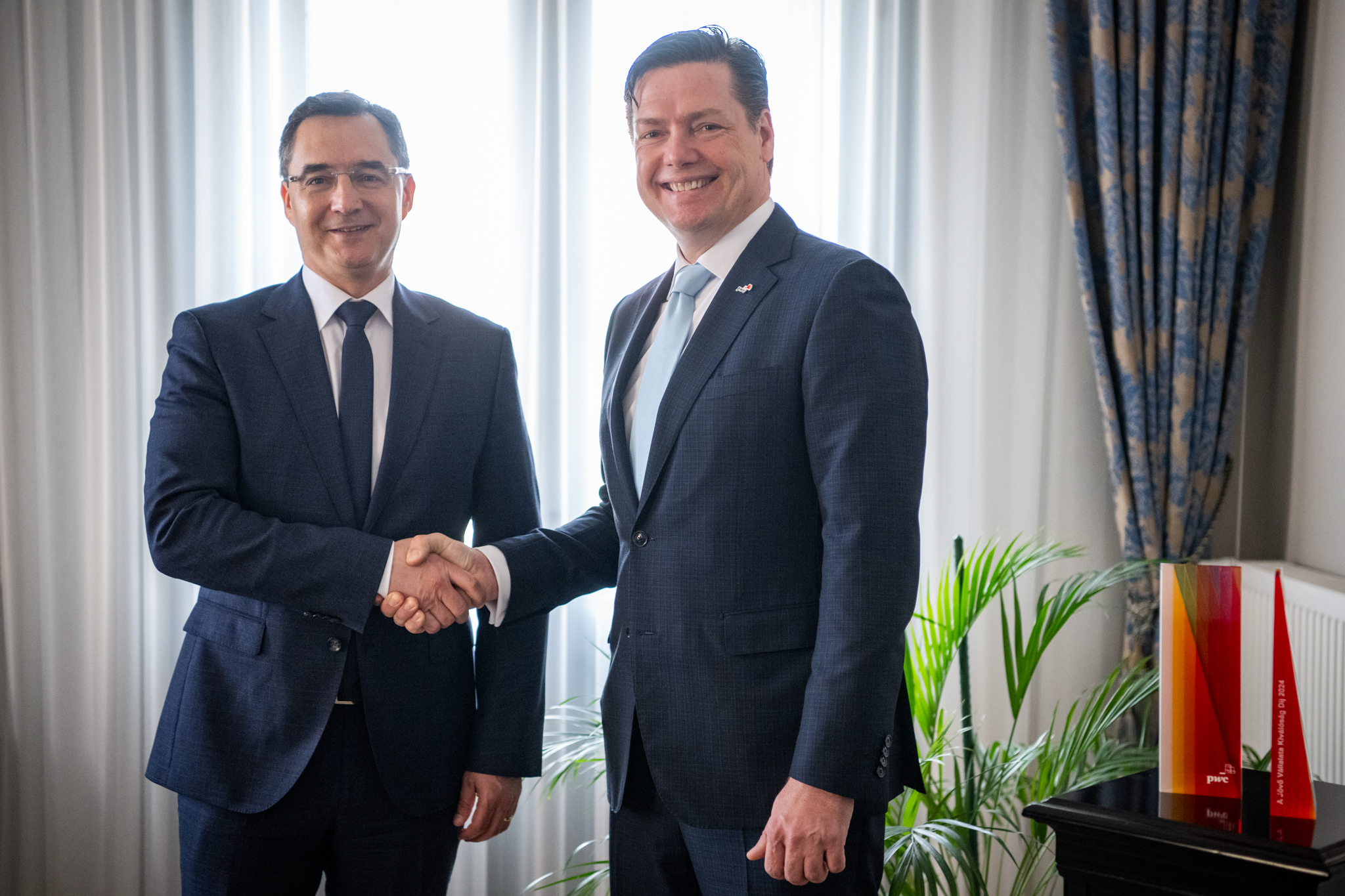Steiner: Electrification key Driver to Hungary’s 2050 Emissions Target

The Transforming Energy System panel discussion featured Christian Zinglersen (EU Agency for the Cooperation of Energy Regulators), Zsolt Jamniczky (E.ON Hungaria Zrt.) László Fazekas (MVM), Franck Neel (OMV Petrom), and Zsófia Beck (Boston Consulting Group), and was moderated by Pál Ságvári (the Hungarian Energy and Public Utility Regulatory Authority, at far left).
Hungary has targeted a 50% reduction in greenhouse gas emissions by 2030, according to its revised plans on energy policy and climate change submitted to the European Commission last August. To fulfill this goal, the government must intervene in “several fields,” particularly electricity, State Secretary of Energy and Climate Policy Attila Steiner of the Ministry of Energy said at the 2023 Budapest Climate Summit on December 4.
“The key topic is electrification: how we can shift from fossil-fuel consumption to electricity consumption. And this is good news, if we manage to electrify because we have atomic energy, renewable energy and local production, [so we] will not have to import so much as with fossil fuels,” he said in the opening presentation of the summit.
He also noted the need for intervention to reduce demand, particularly for fossil fuels (which would reduce emissions and enhance energy sovereignty), along with using substitute fuels, such as biogas, geothermal energy, and hydrogen.
But how, in reality, could the revised targets be achieved? There is no single or simple answer, Steiner emphasized. Rather, a wide portfolio of solutions is needed. Hungary has already made significant steps in the right direction, notably in photovoltaic, which hit 5.5 GW of installed capacity, all with grid connections, at the end of November.
“Green electricity production is very important [….]. Just for comparison, the Paks nuclear plant is 2 GW capacity, so [solar] is two-and-a-half times that capacity, which I think is very good progress,” he said, adding that some 5 GW of additional, though unspecified capacity was “in the pipeline.”
Meanwhile, the expansion of wind generation, which has been stalled by severely restrictive regulations for the past decade, is also set for a boost through legislative changes, Steiner argued. (In November, Minister of Energy Csaba Lantos said that an envisaged reduction in the minimum distance between wind farms and inhabited areas from 12 km to 700 meters could triple wind energy capacity in Hungary from the present 330 MW to 1,000 MW in the near future.)
Battery Storage Plans
Among the package of plans, the state secretary noted that the government has just published a new investment grant scheme for companies, primarily transmission and distribution system operators, to establish up to 885 MWh of battery storage projects to enhance their energy balancing potential while at the local level, a new support scheme will be introduced in January to support household solar generation and storage systems.
Along with the drive to create more mico-generation capacity, the government remains firmly committed to nuclear development, Steiner stressed. To this end, Hungary was among the 22 signatories at the COP28 UN Climate Conference in Dubai that signed up to an initiative to triple the role of nuclear power in global electricity generation by 2050.
To help achieve this, Hungary plans to expand the Paks Nuclear power station with two new 2,400 MW blocks and extend the lifetimes of the existing four 500 MW reactors by a further 20 years.
Naturally, such a swathe of energy investment projects raises the question of finance. Steiner pointed to the European Union’s REPowerEU plan as a significant funding source, from which Hungary has aspirations to receive up to HUF 1.75 trillion for clean energy sector development.
“We are very close to getting the final approval. The European Commission has already approved that plan. If we manage to get those funds, then we can kick-start a lot of projects, significantly contributing to reaching our targets by 2030,” Steiner concluded.
Inextricably Involved
Banks, as intermediary financing agents, are inextricably involved in such investment plans and, indeed, have their own sustainability targets. MBH Bank, Hungarian-owned and recently formed from the merger of three former high-street banking operations (and the main sponsor of the summit), was keen to present its ESG achievements and goals.
The bank’s vision “is supported by two strategic objectives: one is to be a partner to our clients in achieving their sustainability goals, and the other is to raise awareness of sustainability issues among our clients,” András Puskás, deputy chief executive of MBH Bank, told the summit.
MBH’s financing for solar projects (primarily inherited from its constituent banks) had already exceeded HUF 50 billion by the end of 2022, along with HUF 55 billion in funding for green office buildings.
“This year, we have prepared and published a Green Lending and Green Financing Framework, in line with national and international standards, to lay the foundations for our future green lending and bond issuance activities. The objectives set out in the framework include green lending for renewable energy, sustainable transport, sustainable real estate and sustainable agriculture projects,” Puskás said.
Along with its own, ambitious targets to make its internal operations carbon neutral, MBH has specifically committed to increasing the share of green credits in its total portfolio by “at least four percentage points by the end of 2024, and we will launch an intensive green product development program to support this,” he added.
The Climate has Gone ‘Beserk’
“Even in just the last few months, the climate has gone berserk,” an animated Diana Ürge-Vorsatz, vice chair of the Intergovernmental Panel on Climate Change, told the summit.
“They have published this paper alerting us that we have entered a climate era of uncharted territories, and we are in totally uncertain areas,” she said. She spoke from COP28 and stressed that she was quoting from bio-science sources rather than the “climate community.”
“We see that every climate indicator, all the way from Antarctica, the North Atlantic temperature, the ocean temperature, the world surface temperature, wildfires are all out of any normal, reasonable range, and there is no sign of returning to that [former] range. We’d already had the alarming news that this summer, the last June-August, was not only the warmest on records, but it was 0.4ºC warmer than any time before.”
Subsidies no Long-term Solution
“About the future of competitiveness, I think that is the key issue indeed,” said Christian Zinglersen, director of the European Union Agency for the Cooperation of Energy Regulators.
“If we assume that enormous volumes of very cheap pipeline gas are not coming back, then this question comes with a vengeance,” he cautioned, speaking on the panel discussion entitled “Transforming Energy Systems.”
“I think any proposition that we can subsidize our way out towards competitiveness is totally unrealistic; there is not the fiscal balance sheet capacity anywhere in Europe to do that in the long term. Maybe in the short-term, in emergency situations, that could help, but not in the long term,” he said.
“So, what is the asset that we have in Europe which would make us more competitive than otherwise? For me, the answer to that is the [regulated] internal market. […] I think that is our strategic asset.”
This article was first published in the Budapest Business Journal print issue of December 15, 2023.
SUPPORT THE BUDAPEST BUSINESS JOURNAL
Producing journalism that is worthy of the name is a costly business. For 27 years, the publishers, editors and reporters of the Budapest Business Journal have striven to bring you business news that works, information that you can trust, that is factual, accurate and presented without fear or favor.
Newspaper organizations across the globe have struggled to find a business model that allows them to continue to excel, without compromising their ability to perform. Most recently, some have experimented with the idea of involving their most important stakeholders, their readers.
We would like to offer that same opportunity to our readers. We would like to invite you to help us deliver the quality business journalism you require. Hit our Support the BBJ button and you can choose the how much and how often you send us your contributions.









